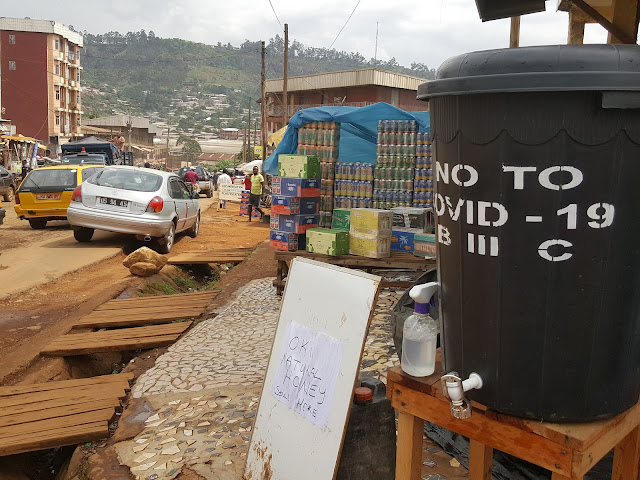By Bakah Derick in Bamenda
Since the outbreak of the coronavirus pandemic, health experts have suggested regular hand washing with runny water and soap as a powerful weapon against the spread of the Severe acute respiratory syndrome coronavirus 2 (SARS-CoV-2)
Municipal councils, non governmental agencies as well as individuals have multiplied efforts to donate or place hand wash stations in public places so as to encourage people to wash their hands regularly.
 |
| Bamenda II hand washing kit infront of Eden Newspaper city chemist Bamenda |
In Bamenda's major streets, there are no shortage of wash hand buckets but surprisingly most of these buckets have no water while others have no soap
"I have noticed that most of the buckets placed in places to wash hands have no water. Especially the ones with writings on them like the council. I think no one has the the responsibility to fill those buckets with water. Another issue is the soap. The soap is either very dirty or there is no soap at all." Chebue Levis tells this reporter at Foncha Junction after he could not wash his hands in one of the spots due to lack of water.
Just a short distance from there around the new road area mile II Nkwen Bamenda III subdivision, this reporter identifies a hand wash station infront of a printert then
 |
| Bamenda IIICouncil hand washing kit at mile two junction |
One of the empty buckets at mile two junction is placed by the Bamenda III Council. This is clearly written on the close to 50l black bucket "No to COVID 19 B III C." When I contacted the Mayor Fongu Cletus Tanwie on who has the responsibility to fill water in the station he replied "People have been given responsibility at all points." To establish follow up, I asked if they were council workers but the Mayor responded "No. Volunteers." A similar response was gotten from sources close to the Bamenda City Mayor as he echoed this during an event by a brewery company to place similar public hand wash stations in some markets around the city.
At the Nkwen market where one of the stations is placed, people nearby raised concerns over the refilling of water. However the City Mayor Achobong Paul says people are charged with them. For instance, in a market, the market master is responsible while in other public places either a store or business unit is charged with filling water inside." What seems not to be clear is who replaces the soap...
At the Bamenda commercial avenue entrance to the Congress hall where a station is placed, a trader nearby tells me "Since that thing was placed there I only saw people wash hands there on that day. After that day I have not seen anyone washing hands there. I don't even know even if there is soap there. These politicians just come put and put things and disappear." He said showing less concern with the entire idea of washing hands with such such public water stands. "I have my hand sanitiser here. I don't go there." He added
 |
| Hand wash kit at the entrance to the Bamenda Congress Hall |
According to experts, Coronaviruses, like this year’s version that has left millions worldwide infected with COVID-19, are encased in a lipid envelope -- basically, a layer of fat. Soap can break that fat apart and make the virus unable to infect you. This is the knowledge that seems to be lacking around.
Observing people in the streets of Bamenda on their hand washing altitude, many make an effort to wash their hands. However only about 5% of them seem to follow all the rules of hand washing. About one in four people just wet their hands without using soap -- a move hygiene researchers call the “splash and dash.” About one in 10 do not wash their hands at all after a trip to the restroom. The most common shortcoming for most people is time as only about 5% spent more than 15 seconds washing, rubbing, and rinsing their hands.
Contact:
Tel: (+237) 694718577/675460750
E-mail: hilltopvoicesinfo@gmail.com

